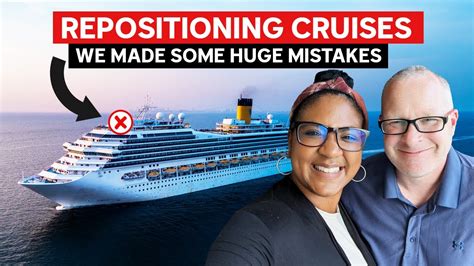
Many experienced cruise travelers fall into common traps that can mar their vacations, ranging from overlooking necessary documentation to failing to factor in potential costs. These oversights can lead to unexpected expenses, missed opportunities, and overall dissatisfaction with what should be a relaxing getaway.
Seasoned cruisers, despite their experience, often commit crucial errors that impact their voyages. From neglecting pre-trip planning to making assumptions about onboard amenities, these mistakes can transform a dream vacation into a series of avoidable headaches. Here are nine critical errors to avoid, based on insights from travel professionals:
1. Overlooking Passport Validity and Visa Requirements
A frequent and critical mistake is overlooking passport expiration dates and necessary visa requirements. Many countries require passports to be valid for at least six months beyond the intended stay. “Make sure your passport is valid for at least six months after your trip,” warns travel experts. Forgetting this can result in being denied boarding or entry into foreign ports. Cruise lines adhere strictly to international travel regulations and cannot override these requirements. Confirming visa requirements is equally important, as these vary depending on nationality and destination. Resources like the U.S. Department of State website provide detailed information on passport and visa regulations for various countries. Travel professionals also recommend keeping a digital copy of essential documents in a secure, accessible location.
2. Neglecting Travel Insurance
Another common oversight is neglecting to purchase comprehensive travel insurance. While many cruisers hope for smooth sailing, unexpected events such as medical emergencies, lost luggage, trip cancellations, or unforeseen disruptions can occur. Comprehensive travel insurance can provide coverage for medical expenses, trip interruption or cancellation, lost or delayed baggage, and emergency evacuation. Policies can be tailored to suit individual needs and often include 24/7 assistance for unexpected issues. Comparing different insurance plans and understanding the coverage details is vital before making a purchase. Pre-existing medical conditions should be disclosed to ensure they are covered by the policy. Without travel insurance, cruisers may face significant financial burdens in case of unforeseen circumstances.
3. Skipping Pre-Cruise Hotel Stay
Arriving on the day of the cruise without a buffer can be a risky move. Flight delays, cancellations, or other travel disruptions can cause cruisers to miss their embarkation. Booking a pre-cruise hotel stay, preferably near the port, provides a safety net and allows travelers to relax and adjust before boarding the ship. This also offers an opportunity to explore the departure city, easing the stress of potential travel mishaps. A pre-cruise hotel stay minimizes the risk of missing the cruise and allows for a more relaxed start to the vacation. It also provides a convenient place to store luggage and handle any last-minute preparations.
4. Failing to Research Onboard Activities and Dining Options
Many cruisers fail to adequately research onboard activities and dining options before their trip. Cruise ships offer a plethora of entertainment, activities, and dining choices, from Broadway-style shows to themed parties and specialty restaurants. Booking popular activities and dining reservations in advance is crucial, as they often fill up quickly. Cruise line websites and mobile apps provide detailed information on onboard offerings and allow passengers to make reservations. Neglecting to do so may result in missing out on desired experiences and settling for less desirable alternatives. Taking the time to explore the ship’s layout and offerings can significantly enhance the overall cruise experience.
5. Overpacking
Experienced cruisers often fall into the trap of overpacking, bringing excessive clothing and accessories that they don’t need. Cruise cabins tend to be smaller than hotel rooms, and storage space is limited. Packing light, focusing on versatile pieces that can be mixed and matched, is essential. Creating a packing list and sticking to it can help avoid overpacking. Considering the ship’s dress code and planned activities can also guide packing decisions. Utilizing laundry services onboard can further reduce the need for excessive clothing. Overpacking can lead to cumbersome luggage handling and wasted space in the cabin.
6. Ignoring Shore Excursion Logistics
Shore excursions are a highlight of many cruises, offering opportunities to explore different destinations and cultures. However, neglecting shore excursion logistics can lead to disappointments. Booking shore excursions in advance is crucial, especially for popular tours with limited capacity. Researching the excursion operators, reading reviews, and understanding the itinerary are also essential. Considering factors such as physical activity level, duration, and transportation arrangements can help ensure a suitable choice. Arriving on time for the excursion meeting point is critical to avoid missing the tour. Bringing necessary items such as sunscreen, hats, water, and comfortable shoes can enhance the excursion experience. Failing to plan shore excursions properly can result in missed opportunities and wasted time.
7. Not Factoring in Additional Costs
Cruise fares typically include accommodation, meals in main dining rooms, and select onboard entertainment. However, cruisers often underestimate the additional costs that can add up significantly. These can include specialty dining, alcoholic beverages, shore excursions, gratuities, internet access, and spa treatments. Setting a budget for these additional expenses and tracking spending throughout the cruise is essential. Taking advantage of beverage packages, dining deals, and onboard promotions can help control costs. Being aware of the potential additional expenses and planning accordingly can prevent unexpected financial surprises at the end of the cruise.
8. Relying Solely on Ship Wi-Fi
While cruise ships offer Wi-Fi access, it can be expensive, unreliable, and slow, especially in certain locations. Relying solely on ship Wi-Fi for communication and internet access can be frustrating. Exploring alternative options such as purchasing international data plans or using Wi-Fi at ports of call can be more cost-effective and reliable. Informing friends and family about limited connectivity and setting expectations can minimize communication frustrations. Disconnecting from the internet and embracing the opportunity to disconnect can also enhance the cruise experience. Over-reliance on ship Wi-Fi can lead to frustration and unnecessary expenses.
9. Forgetting Essential Medications and Toiletries
Forgetting essential medications and toiletries is a common mistake that can cause inconvenience and discomfort. Cruise ships have limited pharmacies, and obtaining specific medications or preferred toiletries may not be possible. Creating a checklist of essential medications, toiletries, and personal care items can help prevent oversights. Packing medications in their original containers and carrying a copy of prescriptions can facilitate refills if needed. Bringing sufficient supplies of sunscreen, insect repellent, and other personal care items can ensure comfort and well-being throughout the cruise. Forgetting essential items can lead to unnecessary stress and discomfort.
In-Depth Analysis and Background Information:
The cruise industry has experienced significant growth over the past few decades, becoming a popular vacation option for travelers of all ages and backgrounds. According to the Cruise Lines International Association (CLIA), the industry generated over $55 billion in economic output in 2019 and supported over 1.1 million jobs worldwide. The COVID-19 pandemic had a devastating impact on the cruise industry, with widespread cancellations and restrictions. However, the industry has been steadily recovering, with cruise lines implementing enhanced health and safety protocols to protect passengers and crew.
The increasing popularity of cruises has led to a greater diversity of cruise options, catering to different interests and budgets. From large mega-ships with numerous amenities to smaller, more intimate vessels focusing on specific destinations, there is a cruise for every traveler. The cruise experience has also evolved, with cruise lines offering more immersive and personalized experiences. These include culinary-themed cruises, adventure cruises, and cultural immersion programs.
Despite the growing popularity and sophistication of cruises, many travelers still make common mistakes that can negatively impact their vacations. These mistakes often stem from a lack of planning, research, and awareness of potential challenges. By avoiding these pitfalls, cruisers can maximize their enjoyment and create unforgettable memories.
Expanded Context and Additional Information:
Passport and Visa Considerations:
Passport validity is a critical factor often overlooked by even seasoned travelers. Many countries require passports to be valid for at least six months beyond the intended stay to allow for unexpected delays or emergencies. This requirement is in place to ensure that travelers have sufficient time to leave the country if necessary. Cruise lines enforce these regulations rigorously, and passengers without valid passports may be denied boarding.
Visa requirements vary depending on the traveler’s nationality and the countries visited during the cruise. Some countries have visa-free agreements with others, while others require visas for all visitors. It is essential to research visa requirements well in advance of the cruise and obtain any necessary visas before departure. Failure to do so can result in being denied entry into foreign ports.
Travel professionals recommend checking passport validity and visa requirements at least six months before the cruise. This allows ample time to renew passports and obtain visas if necessary. Utilizing resources such as the U.S. Department of State website or consulting with a travel agent can provide accurate and up-to-date information on travel regulations.
Travel Insurance Importance:
Travel insurance is a crucial safeguard for cruise travelers, providing coverage for unexpected events that can disrupt their vacations. Medical emergencies are a common reason for needing travel insurance. Healthcare costs in foreign countries can be significantly higher than in the traveler’s home country, and travel insurance can cover medical expenses, including hospitalization, medication, and emergency transportation.
Trip interruption or cancellation is another potential risk. Unforeseen events such as illness, injury, or family emergencies can force travelers to cancel or interrupt their cruises. Travel insurance can reimburse non-refundable expenses, such as airfare, hotel stays, and cruise fares.
Lost or delayed baggage is also a common travel mishap. Travel insurance can provide compensation for lost, stolen, or delayed baggage, allowing travelers to replace essential items and continue their vacation.
Emergency evacuation coverage is particularly important for cruises to remote or exotic destinations. In the event of a serious medical emergency, evacuation to a suitable medical facility may be necessary. Travel insurance can cover the high cost of emergency evacuation, which can range from thousands to hundreds of thousands of dollars.
Choosing the right travel insurance policy requires careful consideration. Factors to consider include the coverage limits, deductible, exclusions, and pre-existing medical condition clauses. Comparing different insurance plans and reading the fine print is essential before making a purchase.
Pre-Cruise Hotel Benefits:
Arriving on the day of the cruise without a buffer is a risky proposition. Flight delays, cancellations, or other travel disruptions can cause travelers to miss their embarkation. Missing the cruise can result in significant financial losses, as cruise fares are typically non-refundable.
Booking a pre-cruise hotel stay provides a safety net and allows travelers to relax and adjust before boarding the ship. A pre-cruise hotel stay also offers an opportunity to explore the departure city. Many cruise ports are located in vibrant cities with numerous attractions, restaurants, and shops. Arriving a day or two early allows travelers to explore these cities at their leisure, enhancing their overall vacation experience.
Choosing a hotel near the cruise port is a convenient option. Many hotels offer shuttle services to the port, making transportation easy and stress-free. Some hotels also offer cruise packages that include transportation, luggage handling, and other amenities.
Onboard Activity and Dining Research:
Cruise ships offer a wide array of onboard activities and dining options to cater to different interests and tastes. From Broadway-style shows to themed parties and specialty restaurants, there is something for everyone. However, many of these activities and dining options require reservations, and popular choices often fill up quickly.
Researching onboard activities and dining options before the cruise is essential to ensure that travelers can participate in their desired experiences. Cruise line websites and mobile apps provide detailed information on onboard offerings and allow passengers to make reservations.
Specialty restaurants offer a more upscale dining experience compared to the main dining rooms. These restaurants typically charge an additional fee, but they often feature unique cuisines and ambiance. Reserving specialty dining in advance is highly recommended, as they tend to be popular.
Onboard entertainment includes live music, comedy shows, dance performances, and Broadway-style productions. Many of these shows are free, but reservations may be required. Checking the cruise schedule and making reservations in advance can ensure that travelers don’t miss out on their favorite performances.
Packing Light Strategies:
Overpacking is a common mistake that can lead to cumbersome luggage handling and wasted space in the cabin. Cruise cabins tend to be smaller than hotel rooms, and storage space is limited. Packing light and focusing on versatile pieces that can be mixed and matched is essential.
Creating a packing list and sticking to it can help avoid overpacking. Considering the ship’s dress code and planned activities can also guide packing decisions. Many cruise lines have formal nights, where passengers are expected to dress up. Packing appropriate attire for these events is important.
Utilizing laundry services onboard can further reduce the need for excessive clothing. Cruise ships offer laundry and dry cleaning services, allowing passengers to wash their clothes during the cruise. Packing a small amount of laundry detergent can also be helpful for washing small items in the cabin sink.
Shore Excursion Planning:
Shore excursions are a highlight of many cruises, offering opportunities to explore different destinations and cultures. However, neglecting shore excursion logistics can lead to disappointments. Booking shore excursions in advance is crucial, especially for popular tours with limited capacity.
Researching the excursion operators, reading reviews, and understanding the itinerary are also essential. Considering factors such as physical activity level, duration, and transportation arrangements can help ensure a suitable choice.
Independent shore excursions can often be more affordable than those offered by the cruise line. However, it is important to choose reputable operators with a proven track record. Reading reviews and checking references can help ensure a safe and enjoyable experience.
Arriving on time for the excursion meeting point is critical to avoid missing the tour. Cruise ships operate on a tight schedule, and excursions depart promptly. Passengers who are late may be left behind.
Bringing necessary items such as sunscreen, hats, water, and comfortable shoes can enhance the excursion experience. Depending on the destination and planned activities, other items such as insect repellent, rain gear, and a portable charger may also be needed.
Additional Cost Awareness:
Cruise fares typically include accommodation, meals in main dining rooms, and select onboard entertainment. However, cruisers often underestimate the additional costs that can add up significantly.
Specialty dining is a common additional expense. Specialty restaurants offer a more upscale dining experience compared to the main dining rooms, but they typically charge an additional fee.
Alcoholic beverages are another significant expense. Cruise lines typically charge for alcoholic beverages, and these costs can add up quickly. Purchasing a beverage package can be a cost-effective option for those who plan to consume a significant amount of alcohol.
Shore excursions are a major expense for many cruisers. The cost of shore excursions can vary widely, depending on the destination, duration, and activities involved.
Gratuities are typically charged automatically to passengers’ onboard accounts. Gratuities cover the services of the crew members who provide meals, housekeeping, and other services.
Internet access is another expense that can add up quickly. Cruise ship Wi-Fi is often expensive and unreliable. Exploring alternative options such as purchasing international data plans or using Wi-Fi at ports of call can be more cost-effective.
Wi-Fi Alternatives:
While cruise ships offer Wi-Fi access, it can be expensive, unreliable, and slow, especially in certain locations. Relying solely on ship Wi-Fi for communication and internet access can be frustrating.
Purchasing an international data plan is an alternative option. Many mobile carriers offer international data plans that allow travelers to use their phones in foreign countries without incurring exorbitant roaming charges.
Using Wi-Fi at ports of call is another way to access the internet. Many cafes, restaurants, and public spaces offer free Wi-Fi. However, it is important to be aware of security risks when using public Wi-Fi networks.
Disconnecting from the internet and embracing the opportunity to disconnect can also enhance the cruise experience. Taking a break from social media, emails, and other online distractions can allow travelers to relax, recharge, and fully enjoy their vacation.
Medication and Toiletries Checklist:
Forgetting essential medications and toiletries is a common mistake that can cause inconvenience and discomfort. Cruise ships have limited pharmacies, and obtaining specific medications or preferred toiletries may not be possible.
Creating a checklist of essential medications, toiletries, and personal care items can help prevent oversights. Packing medications in their original containers and carrying a copy of prescriptions can facilitate refills if needed.
Bringing sufficient supplies of sunscreen, insect repellent, and other personal care items can ensure comfort and well-being throughout the cruise. Sunscreen is essential for protecting the skin from the sun’s harmful rays, especially in tropical destinations. Insect repellent can protect against mosquitoes and other insects that can transmit diseases.
FAQ Section:
1. What is the most common mistake seasoned cruisers make?
One of the most frequent oversights is neglecting to check the validity of their passports. Many countries require passports to be valid for at least six months beyond the intended stay, and forgetting this can lead to denial of boarding.
2. Why is travel insurance so important for a cruise?
Travel insurance provides a safety net against unforeseen events such as medical emergencies, trip cancellations, lost luggage, and other disruptions. It can cover medical expenses, trip interruption, and emergency evacuation, offering financial protection and peace of mind.
3. What are the benefits of booking a pre-cruise hotel stay?
A pre-cruise hotel stay provides a buffer against potential travel disruptions like flight delays, ensuring you don’t miss your cruise departure. It also allows you to relax, adjust to the time zone, and explore the departure city before embarking on your voyage.
4. How can I avoid overspending on a cruise?
To avoid overspending, set a budget for additional expenses such as specialty dining, alcoholic beverages, and shore excursions. Take advantage of beverage packages and onboard promotions, and track your spending throughout the cruise.
5. What should I do if I forget essential medications on my cruise?
While cruise ships have limited pharmacies, obtaining specific medications may not be possible. Always create a checklist of essential medications and toiletries before your trip. Pack medications in their original containers and carry a copy of prescriptions to facilitate refills if needed.









